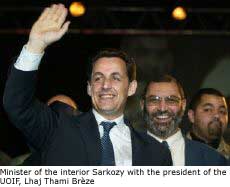|
• Centre for Modern Oriental Studies
(Prof. Ulrike Freitag)
Strategies of adaption
and dissociation
Islamic missionary groups
from South Asia in the European diaspora – the Tablīghī
Jamā’at and the Da’wat-i Islāmī
 The case study, which focuses on the Tablighi Jama´at (TJ)
and the Da´wat-e Islami (DI), aims to assess the repercussions
of South Asian Islamic missionary group activism in the European
context. The study is coupled with a dissertation project. Via
field and literature studies of the subsidiaries of both movements
in Germany and three other European countries (Spain, France,
Great Britain), it explores how movements adapt their missionary
endeavour to the European field. At the same time, missionary
groups will be accompanied to their countries of origin in South
Asia, and their strategy regeneration and translocal networks
observed in detail. The intention of the project is also to contribute
to an understanding of whether these missionary activities will
lead to a further dissociation of Muslims from their host societies
in Europe, as some observers assume, or whether their orientation
towards consolidating Islamic norms will be conducive to integration.
[more...]

Islamic Training Institutes
in Germany
Links to Training Institutes in the
Middle East and Europe
In recent years Muslim initiatives to establish Islamic training
institutes and training circles in Germany have increased (see,
e.g., Islamogische Institut, www.islamologie.info,
founded in 2001). Firstly, the project will present an overview
of these initiatives. In a second step it focuses on 2-3 training
institutes and looks at how they are linked to training institutions
and networks in Europe and the Middle East, such as the Egyptian
al-Azhar University and madrasas in Syria and Turkey, in order
to analyse the transmission of Islamic knowledge both in and to
Europe. [more...]

•
University of Hamburg, Religius Pedagogics (Prof. Wolfram Weiße)
Between participation and disengagement
The Muslim minority and its schools
in South Africa and Europe
The case study draws a comparison between Muslim minority discourses
in South Africa and those in Europe (Netherlands, England), which
are similar in many ways. It focuses on debates about Muslim minority
rights in the context of establishing Islamic schools.
Of particular interest are the links and parallels, and the differences
and divisions between Islamic schools in South Africa and those
in Europe. The analysis delves into the increased networking activities
of South African Muslims with schools in England and the Netherlands,
which are partly organised through the networks of Islamic movements
of South Asian origin, such as the Tablighi Jamaat and the Deobandis.
[more...]

• University of Frankfurt/Oder,
Social- and Cultural Anthropology (Prof. Werner Schiffauer)
Islamism, the Reform of Islam, and Civil Religion
in France
Homepage: http://www.zmo.de/muslime_in_europa/mitarbeiter/peter/
 The research project is concerned with discourses and organisational
structures in the predominantly Franco-Maghrebi federation Union
des organisations islamiques de France (UOIF, founded in
1983). Today, groups and institutions federated in the UOIF are
important sites for debates and practices through which a variety
of actors embedded in transnational networks engage with the laicist
context of France. Taking inspiration from Bourdieu’s field
concept, this project aims to situate and analyse the UOIF in
relation to the emerging Muslim field in France. Particular attention
will be paid to relating the reform projects circulating within
the UOIF to understandings of correct Islamic belief and practice
in other Muslim groups. The study will question common assumptions
on the impact of the French “secular context” on Islam
and seeks to contribute to a better understanding of the spatial
configuration of Islam in France.
[more...]

"Pioneers of 'Euro-Islam'"?
The role of Muslim women in the Milli
Görüs. Crossed views: Germany-Turkey
The project analyses religiously authorised gender discourses
in the Islamic milieu in Germany, concentrating on female and
male actors in the Turkish-Islamic organisation Milli Görüs.
By combining data gathered in Germany with gender discourses and
practices in the Islamic context, the project attempts to provide
a transnational research perspective. It thus analyses the dynamics
of Islam in Europe under the aspect of continuities and discontinuities
Islamic traditions might experience as a result of lasting Muslim
presence in the European context. [more...]

• University of Halle, South Asian
Studies (Prof. Rahul Peter Das)
The Ahmadiya in Germany
Areas of conflict between Islamic
identity and secular embedment
The core of this project is the Islamic reformist movement of
the Ahmadiya in Germany. It originated in South Asia, where it
was founded by Hazrat Mirza Ghulam Ahmad at the end of the 19th
century. Based on the analysis of material published by and about
the Ahmadiya, the first research phase deals with their image
in German society in general and the German media in particular.
Their perception of Germany’s attitude to their movement
will be discussed in retrospect, as will their relationship to
pluralism and the secular environment. Finally, a comparison with
the movement in Great Britain, India and Pakistan will be undertaken
in the context of the above-mentioned issues, which will include
legal and interreligious aspects, as well as the approach of the
countries concerned to Islamic minorities. [more...]
|